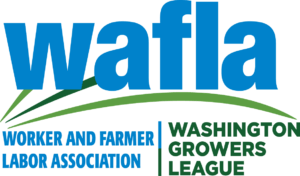Don’t punish small farmers with ‘asylum surcharge’ on guest worker visas

Don’t punish small farmers with ‘asylum surcharge’ on guest worker visas
The Seattle Times
Don’t punish small farmers with ‘asylum surcharge’ on guest worker visas
Link to original op-ed in the Seattle Times
June 6, 2023
By Enrique Gastelum
Special to The Times
Images of people desperately waiting in line to cross our Southern border or, worse, struggling for their lives crossing the desert are pervasive in the media. They are used as cudgels for political gain. There is a lot more to this seemingly never-ending debate.
Post-pandemic, there is a labor shortage that stretches across industries, but for years there have not been enough domestic workers for labor-intensive agriculture. As a result, family farmers have had to rely on H-2A visas to supply workers to plant and harvest the food our communities need. These workers fuel rural economies across the country.
Members farms of Wafla, formerly known as the Washington Farm Labor Association, facilitate a stable supply of labor to harvest everything from apples and berries to shellfish. Through the years, family farms have found this to become increasingly challenging. There is an aging workforce and people moving away from rural communities to population centers, leaving fewer people to produce local, healthy foods.
Last year in Washington alone, the state Employment Security Department found only 11 U.S.-based workers for more than 33,000 farm jobs listed. Farmers, and the local economies throughout the region, rely on guest workers through the federal H-2A visa to fill this labor gap for a successful harvest.
From H-2A workers’ perspective, they have the privilege of legal presence and the worker protections that come with it. They earn a government-mandated wage that is up to 13 times more than doing the same job back home. H-2A workers have free, government-inspected housing during the growing season and are provided transportation to and from their homes.
The opportunity is life-changing for the worker and an expensive last resort for farmers to find labor — and it is on the brink of becoming out of reach for family farms.
Immigration “solutions” from the federal government have only made the challenge worse. The Biden administration is now proposing to increase the fees for these guest worker visas by more than six times for processing paperwork and add an additional “asylum surcharge” of $600 per worker. This could mean that crops stay in the fields or never get planted at all.
Some small family farms build a relationship with specific workers who return season after season. For these farms, which make little or no profit, the fees charged by the Department of Homeland Security to obtain visas for 30 specific workers, by name, will increase from $480 to $3,380, an increase of more than 600%. If the small farmer is willing to file for “unnamed” random workers, the fee increase is only 265%. And these proposed fees are just one of the many fees charged by various agencies when farmers choose to use the H-2A legal worker program.
While inflation has been driving up prices at the grocery store, the producers of these crops are not seeing more revenue for their products. Farmers still receive only about seven cents on each dollar consumers spend on all groceries. A farmer’s input and operational costs have also experienced inflation the past few years. Their operations exist on razor-thin margins, and these higher fees on visa processing could help drive farmers out of business.
This proposed regulation punishes farmers for doing the right thing. It creates an economic disincentive to employ guest workers legally and takes money from farmers to pay government costs for asylum-seekers who have no nexus to farm employment.
The Biden administration needs to understand that these fees are unreasonable, unfair and will hurt rural communities. Congress should reform the H-2A program, making it more efficient, easier to use, and more responsive to the needs of farmers and workers.
Solving our perennial labor shortage on farms will take political courage and practical problem-solving we haven’t seen much of lately. This can be a win-win for border security, creating labor stability in agriculture and economic opportunities for our southern neighbors.
Enrique Gastelum is the CEO of Wafla (wafla.org), grew up in a farmworker family in Central Washington and is a champion for promoting the sustainability of labor-intensive agriculture across the Pacific Northwest.
